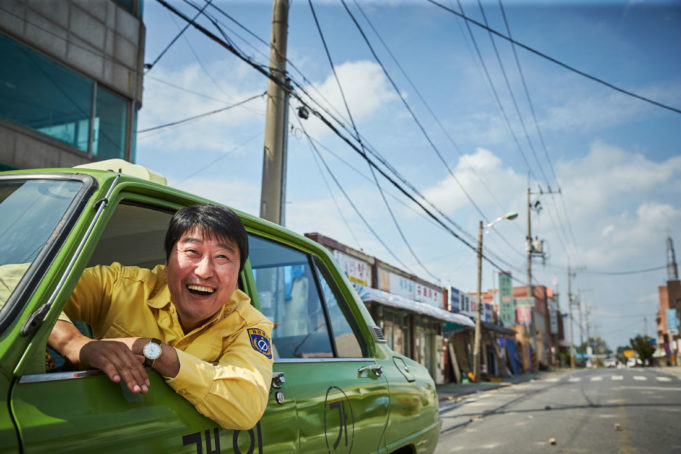If it’s August, it must be time for Korean movies. While Hollywood takes its annual breather between the summer blockbusters and the fall prestige pictures, we often get Korean movies to fill the void at the AMC Grapevine Mills. Those films aren’t always good, but the ones that are are worth a trip to the theater in the dead of late summer. So it is with A Taxi Driver, which is not to be confused with Martin Scorsese’s classic but is rather a history lesson told with enough skill to go down easily.
The film is based on the true story of West German journalist Jürgen Hinzpeter, who was based in Japan in 1980 when he heard that the military dictatorship that had just seized power in South Korea was cracking down brutally on pro-democracy protesters in the city of Gwangju. The city was blockaded, but Hinzpeter managed to get through with the help of a Seoul cabdriver who gave the name of Kim Sa-bok. The name turned out to be fake, but the driver risked his life driving through rioting and massacres to help his passenger get the story and then get back out. Though Hinzpeter wrote books about his experience and expressed the fervent wish to reunite with his brave cabbie, he died last year without ever seeing the man again.
Thomas Kretschmann portrays Hinzpeter in the film, though his character is considerably less vivid than that of Kim, who is played by Song Kang-ho. Because Kim’s identity remains a mystery, the filmmakers are free to invent one for him, so we get a guy who screws a fellow driver out of this European passenger’s pricey fare for the two-and-a-half-hour trip from Seoul to Gwangju, but does it because he’s a widower supporting a young daughter who needs a new pair of shoes. An army veteran, he thinks the protesters are a bunch of hoodlums and doesn’t believe the reports about soldiers opening fire on peaceful demonstrators until he sees it for himself.
Director Jang Hun isn’t completely unfamiliar to North Texas; his spy thriller Secret Reunion, which also starred Song, played here a few years ago. This filmmaker isn’t flashy, but he is efficient. His movies don’t drag, though they never seem to be in a particular hurry either, and this one wears its 137-minute running time lightly. The movie makes comedy out of its early going, before the cab reaches Gwangju, as Kim’s English is limited to only a few words and Hinzpeter has no Korean at all. In the city, they pick up a young demonstrator (Ryu Jeon-eul) who has enough English to act as a translator, and the movie finds time to give him a turn doing some really bad singing as a way of expressing his ambition to make one of the country’s TV shows one day. The movie needs the comedy, because it gets grim when it depicts the chaos of the historical event known as the Gwangju Massacre. Much like Argo, this movie takes liberties with the history for dramatic purposes. It’s true that Hinzpeter hid the footage of the murders in a tin of cookies, but it’s less true that he and Kim escaped thanks to a fleet of Gwangju cabdrivers expressing solidarity with their colleague from the capital. The car chase is shot well nevertheless.
Jürgen Hinzpeter is considered a hero in South Korea, and there’s a memorial to him today in Gwangju, but many Koreans didn’t even know that there was a Korean hero at the center of his story as well. If you wanted an actor to play an ordinary guy who reacts well in a crisis, you could scarcely do better than Song, whose praises I’ve sung before in these pages. Without resorting to histrionics or begging for the audience’s sympathy, he captures this man whose faith in his country’s government gets broken, who pushes past his desperation to get back to his daughter to honor the people he saw being killed. His ordinariness has a gravitational pull that holds this movie together. This is one of the world’s greatest actors, and watching him work is more than enough reason to recommend A Taxi Driver.
A Taxi Driver
Starring Song Kang-ho and Thomas Kretschmann. Directed by Jang Hun. Written by Eum Yu-na. Not rated.










